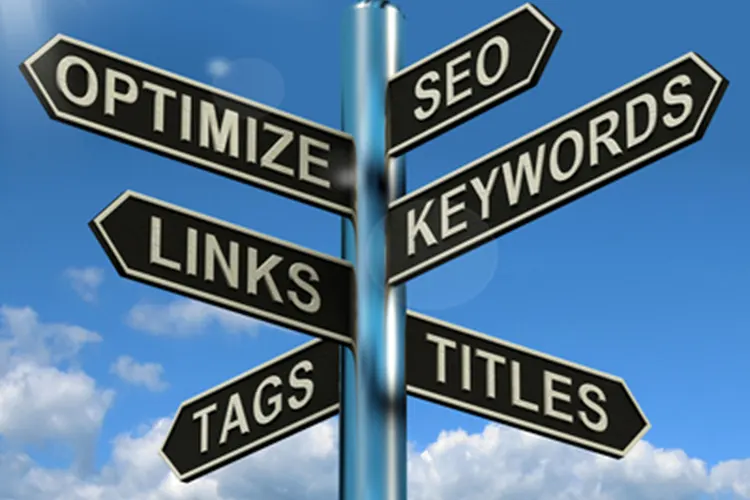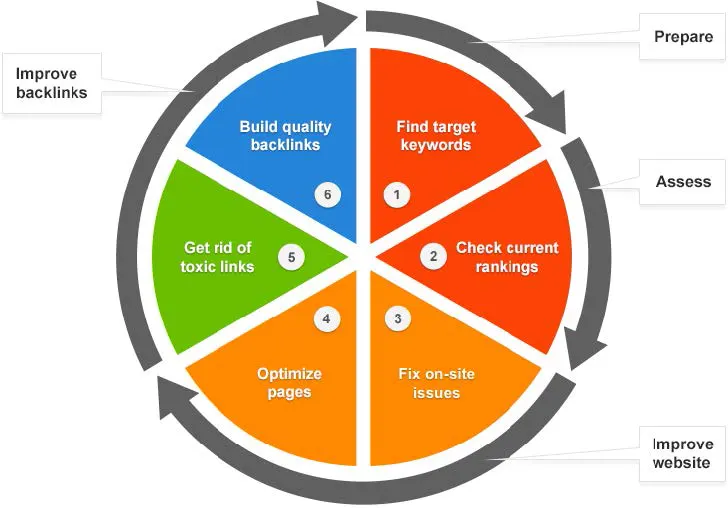Managing Search Engines Effectively Can Be the
Difference Between Success & Failure.
There are two types of Search Engine Placement.
The first type is unpaid, and it is called Search Engine Optimization (SEO).
The second type requires that you pay for it, and it is called Search Engine Marketing (SEM).
Let's take a closer look at each type.
All About Search Engine Optimization (SEO).
The first thing to understand about SEO is that it isn't free. I said it's "unpaid for" because you do not pay the search engine company to be on the Search Engine Results Pages (SERPs). You earn your way there based on your web page content, also known as an "Organic Search Results Ranking."

Utilizing SEO to rank for “effective” keyword phrases is incredibly time-consuming, challenging, and goes way beyond this content scope. However, we believe a few quick takeaways are critically important for the typical small business owner to understand.
Let’s first define an “effective” keyword phrase as anything that potential buyers would search for when looking for someone who sells the same type of product or service you sell.
QUESTION: If you’re going to start with SEO as your primary strategy, how do you know which keyword phrases are most effective? Please Note: I didn’t ask which are the most popular phrases; I wondered which are the most effective?
Leveraging our local SEO services lets us tell you how often a specific keyword phrase is searched for in your particular geography, which means it’s popular, BUT not necessarily effective. There’s a vast difference between the two, which makes an enormous difference in the return on investment you realize from an SEO project.
Unlike some SEO agencies, we can also tell you what keywords your competitors are using to drive traffic to their website and how much traffic a specific keyword produces for them. However, no one can tell you how effective a particular keyword is without trying it out for themselves on your website. Attempting to drive all or even just the most popular keywords is a very costly tactic most utilized by big businesses with enormous budgets. It is not a tactic that routinely produces a measurable ROI for a typical small business and is the number one reason SEO projects fail for small businesses.
Rest assured that every effective keyword phrase related to your industry already has a highly-contended battle in progress, and dozens (possibly hundreds) of companies are currently fighting to be on page one of the search engine results. I have never once, Googled any keyword phrase and had Google respond with an empty page.
An organic search results ranking is not free because you have little or no chance to get to page one on a Google Search Engine Results Page (SERPs) via SEO, without monumental efforts from very skilled, talented SEO specialists. These experienced SEO specialists are not cheap. If you want to hire one to work for you, you can expect to pay a full-time employee a six-digit salary, plus benefits, and the high cost of continuing education is on top of everything else. And finally, you'll need to license some pretty sophisticated (expensive) SEO software tools to make any measurable impact on your project's goals.
If these requirements haven’t scared you away, and you’re still determined to undertake an SEO project that drives high-quality, organic-search traffic to your website, you need a plan. Your plan should include (at a minimum):
- A detailed process plan that is based on the workflow diagram shown below.

- Tools that help you with advanced keyword research by measuring search volumes on both a local and national level.
- Tools that allow you to snoop (examine) your top competitor’s website code.
- Tools that allow you to track both your and your competitor’s search engine ranking progress over time.
- Tools that examine anchor text, meta descriptions, title tags, and other on-page technical SEO ranking factors.
- A link building strategy that helps you build high-quality backlinks with other creditable websites.
Also, consider that while you are making changes that you hope will improve your rankings, it’s highly likely that your organic ranking competitors are also making changes. And recognize that they were already on top, so you must beat them, pushing them down the list, which is more complicated than just maintaining your current position.
When trying to win the SEO battle for page one rankings, this high cost and the sophisticated software tools required to make a measurable impact typically places a project beyond many small businesses' reach.
I didn't say that search engine optimization is a bad investment for a small business. We have many clients who rely on SEO to produce sales leads every day. We believe that SEO has significant value for some small business clients. Still, it would likely not be the first website marketing project we would suggest for most small businesses we meet.
Poorly devised SEO projects are one of the most costly marketing mistake made by many small businesses.
An equally important fact to consider is that SEO is a long-term investment, NOT a short-term marketing tactic. SEO will “typically” not produce significant results for somewhere between 4 and 12 months. It takes time to earn your way to the top. Realize that just because you make a change to your website doesn't mean that Google will stop everything it is doing and jump you to the top of your category.
A Final Thought.
Beware of companies that claim they can get you page one rankings via SEO in a month or so; this is a scam.
You end up either not ranking at all or, perhaps, you rank for worthless keyword phrases that no potential customer would ever search for. SEO is not as simple as these people lead you to believe.
Yes, we offer our SEO services in situations where we believe it to be appropriate.
Our SEO analysts are highly skilled in both national and local SEO services. We license all the top SEO software tools currently available to help us get you the best results possible, and we have the expertise to accomplish the goals we promise.
You should also understand that optimizing regionally (Phoenix SEO) and optimizing National SEO are two very different projects. Optimizing for a local area will make the project a more affordable SEO service than the cost of optimizing on a national level.
If you think your website might warrant an SEO project, give us a call, we're happy to discuss your unique situation, do some competitive research, and make appropriate recommendations based on our findings.
All About Search Engine Marketing (SEM).
As previously stated, Search Engine Marketing requires that you pay to get your placement on the Search Engine Results Pages instead of earning your way there with SEO.
The most common form of Search Engine Marketing by far and way is Pay Per Click Advertising (PPC). Pay Per Click advertising dominates the Search Engine Marketing category to the extent that we’re going to switch this discussion to talk just about PPC instead of the Search Engine Marketing category as a whole.
Pay Per Click Advertising (PPC) works differently.
You pay the search engine company to place your content in a preferred position on the Search Engine Results Page. You bid against others to determine exactly how high on the page Google will list your content. The highest bidder can get to the top of the page with the right content.
Most people don’t understand that other factors (besides your bid amount) impact your position on the Search Engine Results Page. The highest bidder doesn't always get superior placement. Going into all the details of exactly how your placement position is calculated goes way beyond this content’s intended scope. We want to provide an overview, not to educate our competitors who read this page. So, with that said, let’s leave it as the highest bid doesn’t always win.
Another consideration before you undertake any Pay Per Click (PPC) campaign is that the strategy behind running a successful PPC campaign for a small business is significantly different than that of running a campaign for a larger (national) company. Any PPC expert should first understand your marketing strategy and then tailor their services based on that strategy. An excellent test for a potential so-called “PPC expert” is to see if they ask to see, or discuss your marketing strategy before they dive in or even give you a price to perform services.
The Cost Of PPC
I can’t finish discussing PPC without first addressing the issue of cost. The most common criticism we hear regarding PPC is that it is way too expensive. We consistently hear this statement made by potential clients that are looking to hire a firm like us. We respond that Pay Per Click can be extremely costly if you hire the wrong firm.
As SEO analysts, we get to see lots of accounts, and the majority of the accounts we view are throwing away significant amounts of money every month. We’re often able to justify our PPC management fees (and more) based solely on the monthly savings the client will gain by having our experts manage their accounts compared to continuing to run their own PPC services.
Here is Our List Of
The Top Three Most Common Mistakes
That Waste Money In (PPC) Pay Per Click Advertising
- The client implements everything that Google's automated Artificial-Intelligence-Based Algorithms tells them to. Or even that they make changes based on a conversation with their Google Account Strategist (Rep). I’m not saying that Google intentionally leads you down the wrong road. Still, I am saying that, on average, we typically implement less than 5% of what Google's systems or personnel recommend for improvements.
- The client is using some automated service to manage their PPC account instead of a real live person. In both cases, the problem is that computerized functions don’t understand your business, your goals, your competitors (your marketing strategy), and these automated services tend to make silly, often harmful recommendations. Companies that sell a service instead of or in addition to a product will find this statement especially true.
- The person who set the system up didn’t configure it for small business marketing. You should also know that the strategy utilized for a small business will be considerably different than that used by a more substantial company when it comes to search engine marketing. A small business should focus on local search engine results and “filling the gaps” left by the big chains. Small businesses likely have less budget available and are more limited in how aggressive they can be in their search engine marketing efforts, so they must be smarter in their approach.
Let us review your Google or Facebook advertising account at no cost.
We will make recommendations and show you the impact we can make for you.
Schedule Your Free Account Review.
Schedule NowFor most of our clients, we find that a combination of both SEO and PPC work to achieve the best possible results.
In the early stages, the magic combination is likely more PPC weighted than SEO, but there are exceptions.
You should understand that there are other significant pros and cons to each type of Search Engine Placement that go beyond this content scope, but rest assured that we are experts in all kinds of search engine management services.
SEO VS SEM
A Very Brief Summary
The benefits of Search Engine Optimization (SEO) include: Longer-Term Results, More Permanent Results, Measurable Results, and Broad Coverage.
The benefits of Pay Per Click (PPC) include: Immediate Results, Focused Targeting, Experimental In Nature, and Minimal Website Changes Required.
“The fact is, when managed correctly, we find the results from PPC (alone) to work monumentally better than SEO (alone) for most small businesses.”
While you should not attempt to select one or the other based solely on this criteria, this does give you a place to start. If you'd like to debate which one (possibly a combination of both) is best for your company, we're happy to have that discussion with you.
Curious about how we can help you with your current Search Engine Placement effectiveness, why not give us a call to discuss your situation and how we might be able to help?
Let's Talk
